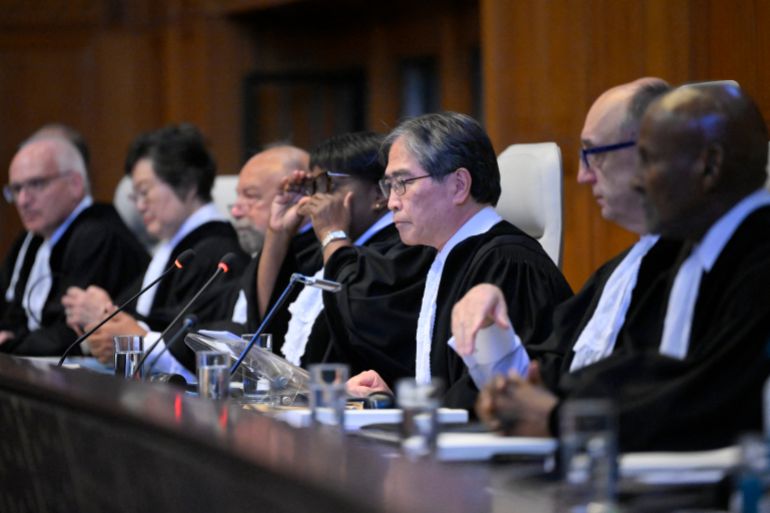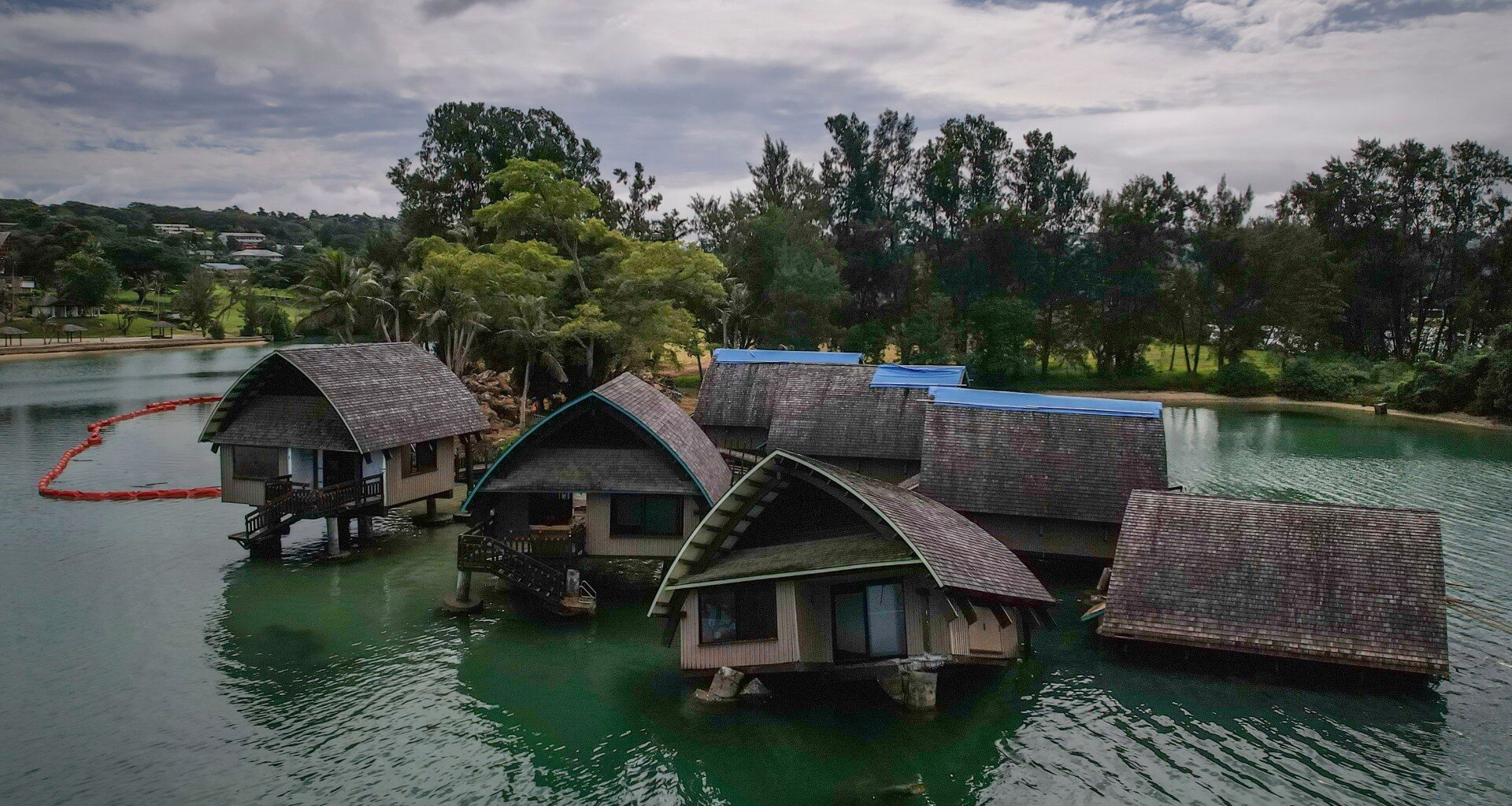The United Nations’ highest court has said that countries must meet their climate obligations – and that failing to do so could violate international law, potentially opening the door for affected nations to seek reparations in future legal cases.
In a groundbreaking advisory opinion delivered at the Peace Palace in The Hague on Wednesday, the International Court of Justice (ICJ) said states must act urgently to address the “existential threat” of climate change by cooperating to cut emissions, following through on global climate agreements, and protecting vulnerable populations and ecosystems from harm.
Reading the opinion, ICJ President Yuji Iwasawa said that greenhouse gas emissions are “unequivocally caused by human activities” and have cross-border effects.
“Failure of a state to take appropriate action to protect the climate system … may constitute an internationally wrongful act,” Iwasawa said. He called the climate crisis “an existential problem of planetary proportions that imperils all forms of life and the very health of our planet”.
Notably, the court said a “clean, healthy and sustainable environment” is a human right. That paves the way for other legal actions, including states returning to the ICJ to hold each other to account as well as domestic lawsuits.
While the ICJ’s ruling is not binding, it said that countries themselves have an obligation to take binding measures to comply with climate treaties. But crucially, the ICJ said industrialised nations have a legal obligation to take the lead in combating climate change, due to their greater historical responsibility for emissions.
The judges also affirmed that countries that signed the 2015 Paris Agreement must ensure their nationally determined contributions (NDCs), their individual national climate plans, are “progressive” and reflect the “highest possible ambition,” in line with the treaty’s aim to limit global temperature rise to 1.5 degrees Celsius (2.7 degrees Fahrenheit).
The opinion was immediately welcomed by environmental groups. Oxfam climate change policy lead Nafkote Dabi said: “This ruling elevates national climate commitments everywhere by confirming that countries must reduce emissions enough to protect the universal rights to life, food, health and a clean environment.
“All countries, particularly rich ones, now have to cut their emissions faster and phase out fossil fuels. Rich countries have to increase their financing to Global South countries to help them reduce emissions and protect their people from past and future harm. This is not a wish list – it is international law.”
Danilo Garrido, legal counsel at Greenpeace International, said the opinion marked the “start of a new era of climate accountability at a global level”.
“The message of the court is clear: the production, consumption and granting of licences and subsidies for fossil fuels could be breaches of international law,” he said. “Polluters must stop emitting and must pay for the harms they have caused.”
Two fundamental questions
After years of lobbying by vulnerable island nations fearing they could be submerged under rising sea waters, the United Nations General Assembly asked the ICJ in 2023 for an advisory opinion, a nonbinding but important basis for international obligations.
The landmark opinion of the 15 judges of the ICJ – who all voted unanimously in favour of the opinion – will carry legal and political weight and is likely to determine the course of future climate action across the world, including whether polluters should be made to pay for their actions.
 President of the International Court of Justice (ICJ) Yuji Iwasawa (centre) and members issue their first advisory opinion on states’ legal obligations to address climate change, The Hague, the Netherlands, July 23, 2025 [AFP]
President of the International Court of Justice (ICJ) Yuji Iwasawa (centre) and members issue their first advisory opinion on states’ legal obligations to address climate change, The Hague, the Netherlands, July 23, 2025 [AFP]
Judges waded through tens of thousands of pages of written submissions and heard two weeks of oral arguments during the ICJ’s biggest-ever case, as they sought to pull together different strands of environmental law into a definitive international standard.
The UN asked the ICJ, a UN court that adjudicates disputes between nations, to address two key questions. What are states obliged to do under international law to protect the environment from greenhouse gas emissions now and for future generations? And what are the consequences for states whose emissions cause harm, particularly to vulnerable island states?
The case was led by the Pacific island nation of Vanuatu and backed by more than 130 countries.
Before the ruling, supporters of climate action gathered outside the court, chanting: “What do we want? Climate justice! When do we want it? Now!”
Paris Agreement
In two weeks of hearings last December at the ICJ, the United States, the world’s biggest historical emitter of greenhouse gases, along with other top polluters, told the judges that existing climate treaties like the 2015 Paris Agreement, which are largely nonbinding, should be the basis for determining their responsibilities.
The Paris Agreement does not explicitly provide for direct compensation for past damage caused by pollution, although at UN talks in 2022, wealthy nations did agree to create a fund to help vulnerable countries deal with current impacts caused by past pollution.
The Paris Agreement saw more than 190 countries commit efforts to limit global warming to 1.5 degrees Celsius (2.7 degrees Fahrenheit).
But it has failed to curb global greenhouse gas emissions, and last year, the UN warned in a report that current climate policies will result in global warming of more than 3C (5.4F) above preindustrial levels by 2100.
Legal experts say the ruling is a victory for small island and low-lying states that had asked the court to clarify states’ responsibilities.
“The ICJ rejected arguments by the likes of the US and UK that governments are bound only by climate treaties such as the Paris Agreement and did not have stronger obligations under international law,” Dabi said.
“We now have a powerful tool for holding countries to account for their obligations, especially in protecting the world’s most marginalised people and future generations of humanity.”
